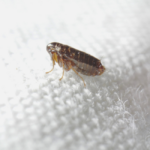
Flea Prevention in Fall: Protecting Your Pets and Home
September 22, 2025
Fall Pest Control Tips Every South Carolina Homeowner Needs
November 17, 2025When fall arrives in coastal South Carolina, temperatures drop just enough to make spiders look for warm, safe places to hide. Your home becomes the perfect spot. Spider prevention matters most during this season because these creepy crawlers often move indoors to escape the cooler air and shorter days. Knowing why spiders enter and how to keep them out can help you protect your home and peace of mind.
Why Spiders Move Indoors in the Fall
Spiders don’t move inside because they love people. They move because the changing weather forces them to find shelter. As outdoor insects slow down, spiders lose their main food source. The warmth and shelter inside homes make an easy alternative. You’ll often spot them in basements, attics, bathrooms and corners of rooms where it stays quiet and dark.
5 Simple Spider Prevention Steps
1. Keep Things Clean
Spiders prefer clutter and dusty corners. When you clean often, you take away their hiding spots and web-building areas. Vacuum baseboards, corners and ceilings to remove webs and egg sacs. Move furniture to clean behind it and don’t forget closets and storage bins. The fewer places spiders can hide, the fewer you’ll find later.
2. Seal Entry Points
Tiny cracks and gaps give spiders easy access. Check around doors, windows, vents and your foundation. Seal any openings with caulk or weather stripping. Make sure window screens fit tight and have no tears. Fix gaps around utility lines where pipes or wires enter the house. Every small repair helps block spider entry.
3. Reduce Outdoor Attractions
Outdoor lights attract flying insects, which attract spiders. Use yellow or sodium vapor bulbs outside since they draw fewer bugs. Trim bushes, shrubs and tree branches that touch your home. Keep firewood and debris piles several feet away from the walls. When the area around your house stays neat, spiders have fewer reasons to hang around.
4. Control Moisture
Spiders often settle where it’s damp. Fix leaking faucets, pipes and clogged gutters. Run a dehumidifier in basements or laundry rooms if moisture builds up. Dry environments make it harder for spiders and the insects they eat to survive.
5. Schedule Professional Pest Control
If cleaning and sealing haven’t solved the problem, The Pest Force can help. Our trained technicians inspect your home, find spider entry points and apply safe, effective treatments. Regular pest control reduces spiders and the insects they feed on, giving you year-round protection.
Spider prevention starts with keeping your home clean, sealed and dry. Fall is the time when spiders try hardest to come inside, but simple steps can make a big difference. If you’re seeing more spiders than you’d like, call The Pest Force for a professional inspection and treatment. Our team will help you enjoy a pest-free home this fall and beyond.
FAQs
1. How do I stop spiders from coming into my house in the fall?
You can stop spiders from coming inside by sealing cracks around doors, windows and vents. Check your screens for holes and make sure weather stripping fits tight. Keep your home clean and free of clutter since spiders like quiet corners. Vacuum baseboards and ceilings often to remove webs and eggs. Regular pest control treatments from The Pest Force add another layer of protection by creating a barrier that keeps spiders outside.
2. Why do I see more spiders in my house during the fall?
You see more spiders in the fall because the temperature outside drops while your home stays warm and dry. As insects become less active outdoors, spiders start looking for food and shelter inside. Homes offer both. You’ll notice them more in basements, bathrooms and closets where it’s darker and less disturbed.
3. What keeps spiders away naturally?
You can discourage spiders naturally by keeping your home clean, reducing moisture and trimming vegetation that touches your house. Vacuuming removes webs and eggs before they hatch. Using yellow outdoor lights instead of white ones can help since they attract fewer insects, which means fewer spiders hunting for food near your home. Even small steps make a big difference in keeping them outside where they belong.
